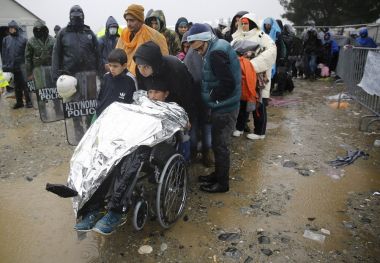Paris terror attacks worsen refugee crisis as Europe shuts door amid fear of ISIS agents among migrants

The shocking Paris terror attacks last Nov. 13 which left 130 people dead and hundreds more injured have only worsened the refugee crisis in the Middle East.
Christian ministries in the region have reported increased difficulties as some European countries have decided to shut their doors on Syrian refugees, according to the Gospel Herald. These countries have tightened their refugee flow since there are reports that operatives from the Islamic State (ISIS) jihadist and terrorist organisation are recruiting fighters from among the refugees and have already infiltrated their camps.
The fear first surfaced when investigators found out that at least two of the Paris attackers arrived in Europe by blending in with the refugees.
However, the non-profit organisation Christian Aid Mission said in a report that majority of the migrants are families, women, children, and the elderly who have been victims of ISIS themselves, and would not want anything to do with the ISIS.
"The Paris attack has affected us in Jordan very much," the director of one ministry serving the refugees said. "And it has affected the refugees themselves, because now they have lost hope of going to Europe and starting their lives there."
Prior to the Paris attacks, over four million Syrian refugees had gone to neighbouring countries like Jordan, Turkey and Lebanon, compared to only 700,000 going to European countries, a report from vox.com revealed.
"Those countries in the middle of Europe have closed their doors to receive refugees, and the news is being spread around in the camps here," the director of a ministry native to Turkey said. "So they are choosing to stay in Turkey. Also, now the opportunity to sail by boat to other countries is becoming more difficult for them, due to the agreement between the Turkish and European governments over the past few months. So those choosing to leave Turkey have slowed down considerably."
Even though Turkish locals are trying to keep an open mind, the director noted that they are holding back from being too friendly to the refugees because they are fearful of any possible attack. The stigma is not lost on the refugees as well, and they feel shameful over something they have nothing to do with.
"One can sense that the refugees themselves are feeling judged and looked over as though they may be affiliated with ISIS and are dangerous. This makes them feel ashamed, when really they want to be connected but can't make that clear to the church members," he said.
The ministry director is encouraging Christians worldwide to send monetary aid so that the organisation can help refugees and continue praying for those who are suffering in the Middle East. He believes that this is actually the opportune time to bring people closer to God.
"Our hope is in the God who turns evil into good, and does miracles to turn the hearts of mankind from terror to searching for God's goodness," he said. "There are people having experienced the terror of ISIS who come to me saying, 'I want to be a Christian.'"











